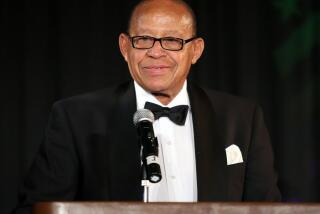Tom Dixon dies at 94; L.A. radio’s voice of classical music for over 50 years
- Share via
Tom Dixon, who was a familiar voice to classical-music lovers for more than 50 years as a Los Angeles radio host, has died. He was 94.
Dixon died March 13 of age-related causes at a rehabilitation facility in Burbank, said his wife, Catherine.
When it comes to classical music radio in Los Angeles, “you think of Tom Dixon,” said Don Barrett, publisher of LARadio.com.
“He is the hood ornament, the face of classical radio,” Barrett said. “In this day and age of consolidation and radio stations making changes so quickly, to have that longevity is just unheard of.”
Jim Svejda, an announcer at classical station KUSC-FM (91.5) who knew Dixon, said he “was a total pro and a consummate gentleman of the old school.”
“He was just the nicest guy, totally knowledgeable, totally prepared,” Svejda said. “He loved the subject, never got tired of the subject, and he always made you feel that he was as excited to discover the stuff as you were.”
Dixon already was a seven-year broadcast veteran in 1946 when he became a host on the classical station KFAC. It remained his home for the next 40 years.
Fired from KFAC by its new owners along with other hosts in early 1987, Dixon presided over a nighttime classical music program at KUSC from 1987 to 1988 before moving to KKGO-FM (105.1), another classical station.
When he retired in 1998 at 82, Dixon was known as the Southland’s longest-running radio host.
“I feel like I’ve been beached,” he told The Times in 1998. “They made me an offer, but I couldn’t accept it because of the penalty with Social Security.”
Two years earlier, when a Times reporter asked him to comment on his 50 years as a radio host, Dixon initially attributed his longevity to luck. But upon reflection, he conceded there was more at play.
“By having a knowledge of classical music, I fell into a format that never changes,” he said. “If I had been a red-hot disc jockey for a trend -- big bands or whatever -- I would have been gone. . . . Classical music, from the time I started at KFAC in 1946, is the same commodity.”
And it was a commodity Dixon loved.
In 1996, the Los Angeles Philharmonic’s executive vice president and managing director, Ernest Fleischmann, called Dixon “classical music’s favorite uncle.”
“He’s made a lot of people sort of look at classical music as something that doesn’t threaten. There’s something so wonderfully unpretentious” about him.
Born in Edmonton, Canada, on Sept. 28, 1915, Dixon moved with his family to Los Angeles when he was 7. He was introduced to classical music two years later by his father, who began taking him to concerts.
Dixon graduated from Los Angeles City College, where he studied drama, in 1935.
But after a bout with tuberculosis, he gave up dreams of becoming an actor and landed his first radio job, at KHJ-AM, in 1939.
As a classical radio host, Dixon was known for his mellow baritone and for keeping his own authoritative commentary to a minimum.
“The music is what you’re presenting, not yourself,” he told The Times in 1996.
Dixon was known for his sense of humor and loved to tell radio stories off the air, often at his own expense.
During his 1996 interview with The Times, he recalled one such anecdote from a live interview with Beverly Sills. She told him during intermission that she was staying at the Beverly Hills Hotel.
“So I said, ‘Welcome back to “Luncheon at the Music Center.” My guest is the great soprano Beverly Hills.’ And before I could apologize and correct it, she starts to giggle. ‘Tom, there is a girl in town at the Largo who takes her clothes off for a living, and her name is Beverly Hills. I don’t think anyone would pay 25 cents to see me [do that].’ ”
Asked what his approach to classical music was, Dixon said in 1996, “I can’t approach it in an academic sense. This, unfortunately, kind of puts you down like you don’t have lofty ideas. I don’t think you have to. Classical music triggers your imagination. It’s to be enjoyed.”
Besides his wife of 44 years, he is survived by a granddaughter.
More to Read
The biggest entertainment stories
Get our big stories about Hollywood, film, television, music, arts, culture and more right in your inbox as soon as they publish.
You may occasionally receive promotional content from the Los Angeles Times.










